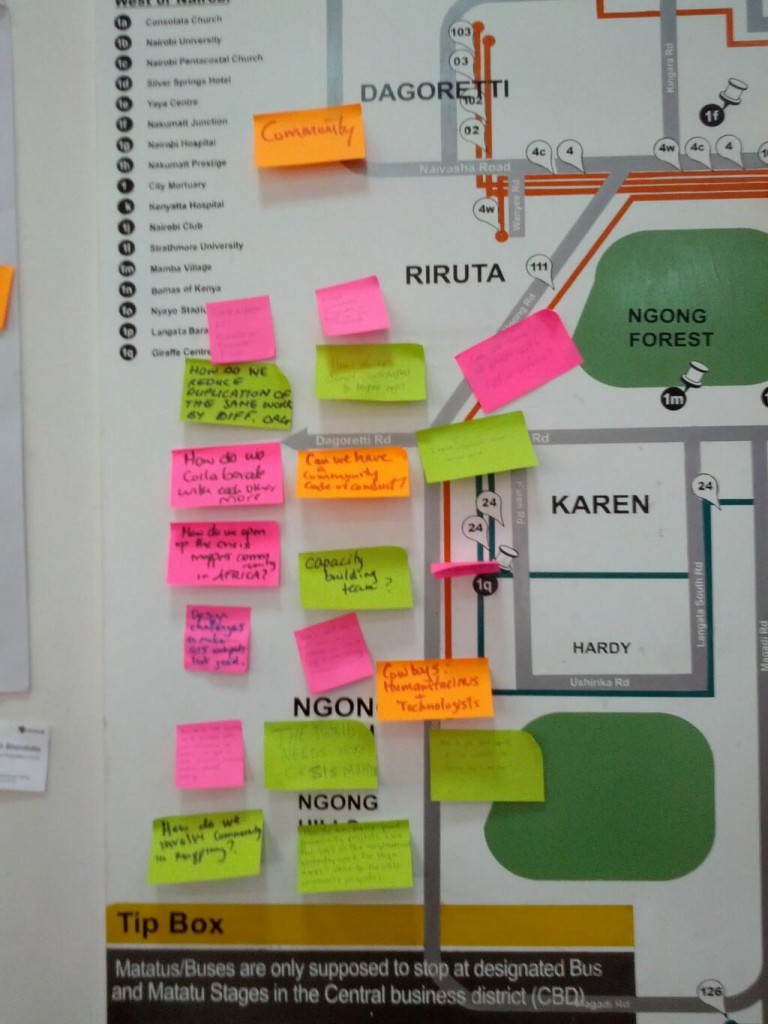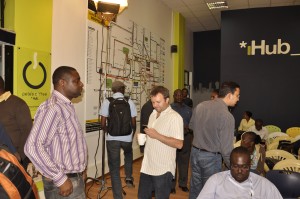Every organizer dreams of that perfect mix of location and glue for their work. There is this moment that an event gells and you can breath. Running the International Conference of Crisis Mappers pre-conference training was a true pleasure. I curated 4 tracks: mobile/security, maps, data and knowledge. Then, I recruited some of the best talent both already in the CrisisMappers community and groups/areas that there were gaps. Thanks to all my fellow presenters, trainers, ICCM organizers, sponsors (Ihub and Ushahidi) as well as all the participants.
We did not take full notes for all the amazing sessions. There were 105 participants split across all the various areas. It was an honour to have long time community members and new folks blend to build. The closing session was a group brainstorm. (See the ideas captured below.) To be honest, we were super exhausted from jetlag and learning. Here are some of the key questions or statements that everyone had at the event – in analog form. While is it a stream of conscious list, I think it speaks volumes about some of the other gaps / opportunities that we need to discuss. It is a window into a time and place.
On a more personal note, Ihub and Ushahidi gave us an amazing space and food sponsorship to help make this day a success. It was great to have the community together in the place that really ignited the movement. ihub is also one of my favourite event venues. It has this pulse that brings people closer together in a casual way. It was perfect for a very mixed crowd to really bond.
What questions do you think we should be discussing? What are some of the conversations you want to be having?
Community
- Create a forum for humanitarian innovation forum
- How do we reduce duplication of the same work by different organizations?
- How do we collaborate with each other more?
- How do we open up the crisis mappers community in Africa
- Design challenges to make GIS Ouputs look good
- How do we make innovation and its disruptive power more palatible to actors and governments in more politically/confict-affected settings
- How do we involve community in mapping?
- Find common projects so that we can collaborate
- how do we connect crisis mappers to response organizations
- Can we have a community code of conduct?
- Capacity building team
- Tech in itself does not solve any problems. We need to plug it in to existing processes
- The world needs more crisis mappers
- how do we make good community projects like the Sms in the neighbourhood yesterday work for larger areas?
voice to the little community projects - post disaster anti-corruption management of funding and relief / rebuild “citizen” reporting
- How do we involve community in mapping?
- how do you build capacity of local community for learning how to read maps?
- Humanitarians ethics in the information age
Cowboys : Humanitarians and Technologists
Data Ethics
- What data ethics?
- Privacy
- Managing data security in a security-sensitive environment
Technical
- Data analysts needed
- Crisis mapping (is a social media)
- When does geodata need data models? When can they be adhoc?
- Best url for 101 on regular expressions?
- Support mapping through satellite communication systems
- How do we use the info we collect/ what is the purpose and impact?
- Big data – identification and analysis
- What is relevant data?
- Why is there such a gap between web mapping and GIS on the desktop?
- Data sharing and coordination
- SMS or IVR for monitoring for education services (Primary) – eg. teacher attendance
- Mobile delivery
- How do you get structured data from a large illiterate user base speaking local dialects
- How do we avoid stovepipes of innovation?
- How do we leverage donor funding without competing for the same funds?
- How can we use sensors?
Future
- Will anyone their passport tomorrow
- How to remember all the stuff we heard today?
- Follow-up forums
- Online training for this group
- Psychological Crisis
- Evaluate the context
- how do you manage expectation of people who provide data on maps? (response capacity)
- 1 kill = or does not equal 20 000 kills
- How can crisis mapping contribute to reach out and help urban refugees?
Thanks everyone!

